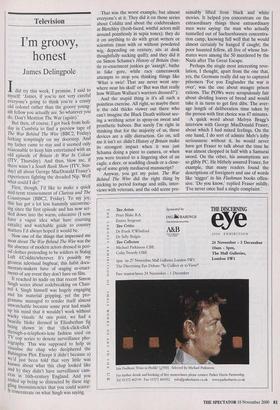Television
I'm groovy, honest
James Delingpole
Idid try this week, I promise. I said to myself: 'James, if you're not very careful everyone's going to think you're a crusty old colonel rather than the groovy young- ish fellow you actually are. So whatever you do, Don't Mention The War (again).' But then, of course, I got back from holi- day in Cumbria to find a preview tape of The War Behind The Wire (BBC2, Friday) lurking temptingly on my doorstep. And my father came to stay and it seemed only reasonable to keep him entertained with an old episode of Britain At War In Colour (ITV, Thursday). And then, blow me, if there wasn't a South Bank Show (ITV, Sun- day) all about George MacDonald Fraser's experiences fighting the dreaded Nip. Well what could I do?
First, though, I'd like to make a quick mid-term reassessment of Clarissa and The Countryman (BBC2, Friday). To my joy, this has got a lot less hammily unconvinc- ing since the first episode and has now set- tled down into the warm, educative (I now have a vague idea what hare coursing entails) and watchable guide to country matters I'd always hoped it would be. Now one of the things that impressed me most about The War Behind The Wire was the the absence of modern actors dressed in peri- od clothes pretending to be soldiers in Stalag Luft 4/Colditz/wherever. It's possibly my greatest televisual bugbear, this habit docu- mentary-makers have of staging re-enact- ments of any event they don't have on film. It reached its nadir on that recent Simon Singh series about codebreaking on Chan- nel 4. Singh himself was hugely engaging and his material gripping, yet the pro- gramme managed to render itself almost unwatchable because some prat had made up his mind that it wouldn't work without 6eIcY visuals. At one point, we had a ardie bloke dressed in Elizabethan fig being shown in that 'click-click-click' through-a-telephoto-lens fashion used on TV cop series to denote surveillance pho- tography. This was supposed to help us visualise the chap who deciphered the Babington Plot. Except it didn't because a) he'd just been told that very little was known about what this chap looked like and b) they didn't have surveillance cam- eras in 16th-century England. And you ended up being so distracted by these nig- gling inconsistencies that you could scarce- loY concentrate on what Singh was saying. That was the worst example, but almost everyone's at it. They did it on those series about Colditz and about the codebreakers at Bletchley (fresh-faced, wistful actors mill around pointlessly in sepia tones); they do it on anything to do with great writers or scientists (man with or without powdered wig, depending on century, sits at desk thoughtfully sucking quill); and they did it on Simon Schama's History of Britain (bat- tle re-enactment junkies go `aaargh', bathe in fake gore, while racy camerawork attempts to stop you thinking things like `What a swiz! That axe never went any- where near his skull' or 'But was that really how William Wallace's warriors dressed?').
And the stupid thing is it's all such a pointless exercise. All right, so maybe there is the odd thicko viewer out there who can't imagine the Black Death without see- ing a writhing actor in spray-on sweat and prosthetic buboes. But surely I'm right in thinking that for the majority of us, these devices are a silly distraction. Go on, tell me it isn't so: didn't History of Britain make its strongest impact when it was just Schama doing a piece to camera, or when you were treated to a lingering shot of an eagle, a deer, or scudding clouds or a close- up of some grisly mediaeval manuscript? Anyway, you get my point. The War Behind The Wire did the right thing by sticking to period footage and stills, inter- views with veterans, and the odd scene pre- sumably lifted from black and white movies. It helped you concentrate on the extraordinary things these extraordinary men were saying: the man who actually tunnelled out of Sachsenhausen concentra- tion camp, knowing full well that he would almost certainly be hanged if caught; the poor haunted fellow, all five of whose hut- mates were among the 50 murdered by the Nazis after The Great Escape.
Perhaps the single most interesting reve- lation, I thought, apart from the one that, yes, the Germans really did say to captured prisoners 'For you Englander the war is over', was the one about meagre prison rations. The POWs were scrupulously fair about dividing loaves of bread and would take it in turns to get first dibs. The aver- age length of deliberation time taken by the person with first choice was 47 minutes.
A quick word about Melvyn Bragg's interview with George MacDonald Fraser, about which I had mixed feelings. On the one hand, I do sort of admire Melv's lofty seriousness: without it, he would never have got Fraser to talk about the time he was almost chopped in half with a Samurai sword. On the other, his assumptions are so glibly PC. He blithely assured Fraser, for example, that many readers found the descriptions of foreigners and use of words like 'nigger' in his Flashman books offen- sive. `Do you know,' replied Fraser mildly, `I've never once had a single complaint.'


































































































 Previous page
Previous page